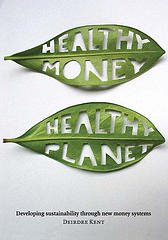Review published in Yes! Magazine May 2006
Healthy Money Healthy Planet
by Deirdre Kent
reviewed by Paul Glover
There are already thousands of run-for-your-life crisis books. Celebrations of success are rarer. Deirdre Kent’s book Healthy Money, Healthy Planet is a fine contribution to the latter, a great find for those who want to convert bad news into good news that exemplifies the world we want.
Community currencies, for example, have begun to prove that economics and ecology can become friends. Local cash can fix problems that dollars ignore.
Healthy Money helps currency organizers more effectively explain the differences between money which connects people and money that controls people. Kent starts with an authoritative history of national money systems.
Commercial bankers create money just by signing loan contracts. Only ten percent of the dollars lent are backed by bank reserves; 90% are fantasy credits. Here’s the trick: the interest charged can never be repaid because, like musical chairs, the money lending game doesn’t provide enough credits for repaying both principle and interest. The resulting deliberate dollar scarcity forces a desperate scramble for sales regardless of damage to communities and nature.
Bankers foreclose the inevitable losers then control more wealth than ever. And control of money decides where jobs are available and for how long; decides who owns land and what gets built; decides what is legal and what’s a crime; decides who lives well and who struggles. (For a fuller discussion of money systems, see Thomas Greco, “The Trouble with Money,” and Bernard Lietaer, “Beyond Greed and Scarcity,” YES! Summer 1997.)
Why should bankers have all the fun? Healthy Money provides two essential tools to citizens creating community currency that’s dedicated to social justice, environmental repair, and neighborhoods. First, it introduces the varieties of grassroots credit systems and summarizes their strengths and weaknesses.
Kent compares the multitude of paper scrips, digital credits, smart cards, and barter banks. She prefers that monetary theorists take action, and risk blundering in the real world.
At the same time, Kent exhorts community organizers to act on the larger stage. She endorses “healthy globalization” for labor rights and environmental justice. She is enthusiastic about commodity-backed international currency (like the Borsodi Constant), and carbon emission rights currency. The Constant’s value was measured by aggregate current sales from harvests and mines, while trading the rights to spew carbon oxides seeks to cap global pollution. She recommends that currency activists learn business sense from those who comprehend profit and loss.
And since money when banked multiplies its force, community banking is considered just as necessary as community currency.
Some community currency advocates are skeptical of local currencies that are not backed by national currency. But all national currencies are in debt to nature, since modern economies extract resources faster than they replenish.
Even the United States’ dollar is backed no longer by vast domestic petroleum reserves, boundless woodlands and deep soils, nor by gold or silver, but by $6 trillion debt, rusting industry, and declining military control of foreign oil.
That’s why HOUR systems (ithacahours.com) are deliberately backed by local labor and sustainable partnership with nature. As the notes say, “HOURS are backed by real capital: our skills, our time, our tools, forests, fields and rivers.” When dollars, euros, yen and yuan fade, HOURS can take over.
Kent does not pretend to have written a how-to manual. She seems like a genial schoolteacher walking the rows, inviting our attention to choices. But Healthy Money prepares us well to understand finance, while making it serve our neighborhoods and revive the planet ourgrandchildren will inherit.
Paul Glover is founder of Ithaca HOURS, the Ithaca Health Alliance, and Citizen Planners of LosAngeles. He is a consultant for grassroots economic development: paulglover.org
____
Wednesday, July 05, 2006
Subscribe to:
Post Comments (Atom)


No comments:
Post a Comment